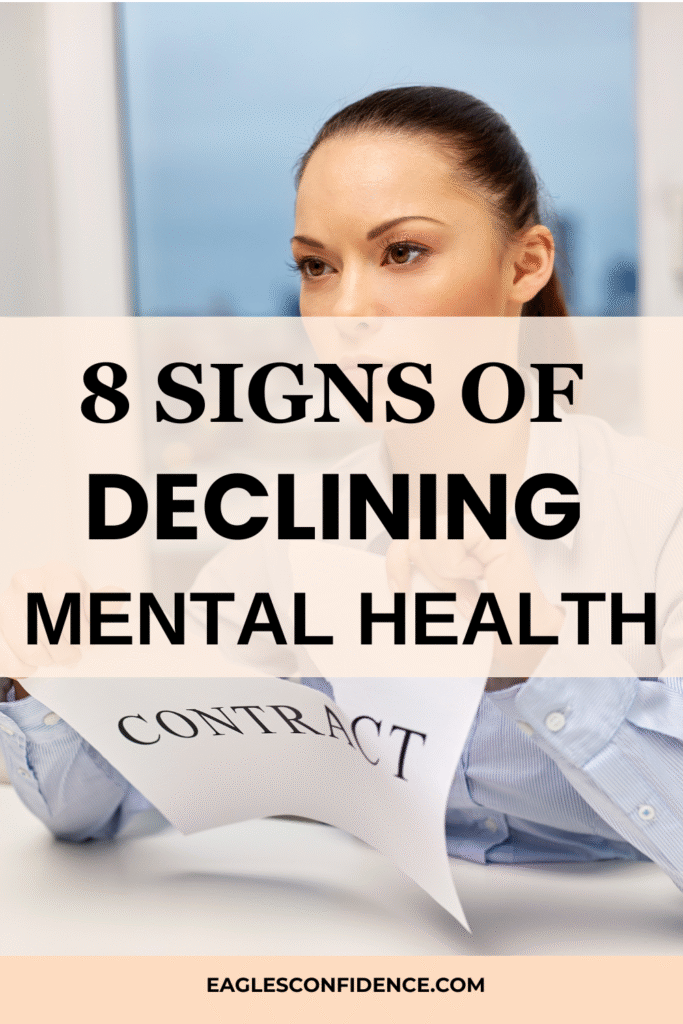Mental health is an often-discussed aspect of a healthy mind. It is responsible for how one relates to others, their ability to cope with daily life, how one makes decisions, and more. Mental health issues, on the other hand, can lead to impairments that affect one’s ability to complete normal routines, relate to others, or take part in work or school. While these effects can have devastating consequences for an individual, others may not be aware that a person is in this state.
If a person experiences feelings of sadness, irritability, or moodiness, withdraws from previously enjoyable activities, has changes in eating and sleeping patterns, experiences unexplained aches and pains, or several other potential signs, they may be suffering from declining mental health. These issues, and the ones in the following list, can negatively impact an individual’s ability to complete normal routines, relate to others, or take part in work or school. While these effects can have devastating consequences for an individual, others may not be aware that a person is in this state.
Awareness of one’s changing mental state is one of the most significant ways in which someone can begin to improve their mental health. If a person, or someone the individual knows, is experiencing the discussed signs of declining mental health, the following measures should be taken to ensure the best possible outcome. The first, and perhaps most important, measure an individual can take is to seek professional help. Mental health professionals, like psychologists or licensed counselors, are professionals who have been trained to offer aid in these areas.
Signs of Declining Mental Health
1. Change in Appetite and Weight
A change in appetite, whether gaining or losing it, is an early warning sign of declining mental health. Someone who is stressed or anxious may use food as a coping mechanism, which can result in overeating. In other cases, a person who is feeling down may not have the desire to eat as much, leading to a weight loss. Weight changes can be a visible sign that a person’s mental health is going down.
Weight and self-image are closely related, and gaining weight from overeating can make a person feel bad about themselves, which can make the situation worse. A person’s self-image can also drop with significant weight loss, which can lead to mental health decline. Both of these issues can hurt someone’s mental health by increasing the intensity of negative emotions. Weight changes can also have social effects on an individual, for example, making it difficult for someone to take part in activities with friends or family.

2. Withdrawal from Loved Ones
The last thing a person wants to do when their mental health is suffering is to hang out with their friends or family. There are several reasons for this, most of which have to do with the emotions and thoughts that the individual experiences while their mental health is low. Shame, guilt, or feeling like a burden are emotions a person can experience while their mental health is suffering.
The weight of these negative emotions is why people tend to distance themselves from others. In many cases, someone may also experience heightened levels of anxiety or sadness which can make social interactions seem like a chore instead of a perk. Additionally, there is also a lot of pressure for someone to hide their emotions, which adds another layer to this issue. Withdrawing from family and friends can create a cycle where a person’s mental health continues to worsen because they feel isolated or unwanted by the people they care about.
3. Change in Sleep Patterns
Insomnia, or hypersomnia, which is excessive sleeping, is another sign that someone’s mental health may be on the decline. This is because poor sleep has been proven to cause stress and anxiety which will worsen the mental state of an individual. On the other hand, mental health disorders can cause significant imbalances with the sleep patterns of an individual which can lead to mental health decline.
Depression, for example, often makes it difficult for a person to get enough rest which can also affect their overall quality of life. Nightmares and vivid dreams are also very common among people who are going through some sort of mental health crisis. This is because anxiety can often play a part in these dreams, which are a manifestation of fear, which increases exhaustion in the person.
Related: 7 Proven Strategies To Increase Your IQ
4. Irritability and Mood Swings
A significant sign that someone’s mental health is declining is that they become irritable. This means that the individual may become agitated or angry very quickly, leading to many issues with both productivity and coping in the long term. This is because someone with a heightened sensitivity to stress may be triggered by even the slightest inconvenience.
These mood swings and irritability often can lead to sudden changes in how a person acts. This can be especially baffling to friends and family, as people experiencing these issues may react or do something suddenly, making no sense to a bystander. Mood swings can also range from all-time lows to excessive highs, which can be as disruptive as an extreme temper.

5. Feeling Hopeless
Feelings of hopelessness are another major warning sign of declining mental health in a person. This is the emotion that is often felt when a person’s mental health has been going downhill for a while, and they feel like they will never get out of this rut. Friends and family may also notice a person pulling away from social interactions, thinking that no one cares about what they are going through.
Hopelessness can be both a result and an antecedent to more serious mental health issues, which is why this warning sign should not be ignored. Behaviors can quickly spiral out of control, and the person themselves may not even recognize how quickly things are going down. At this point, the individual is likely to be a lot more isolated, feeling like they have no friends or family to help. As mentioned before, not receiving any sort of help will likely increase a person’s mental health issues.
6. Poor Concentration and Performance
A person’s performance at work or school is also significantly impacted when their mental health is in decline. This is because one of the aspects of mental health that gets affected is a person’s cognitive performance, which heavily affects their focus. A person may find it difficult to concentrate or may be easily distracted, making it difficult to get work done.
As a result, an individual who is experiencing the issues may become a lot less productive. This may be something that causes more stress on the person’s mind as they cannot focus, which will make the situation worse. A student who was once an A-student may start skipping out on classes because they are no longer able to perform as well as they used to. People who may have been strong performers at work may start slacking off, which can lead to even more problems in the long run.
Related: How To Reprogram Your Subconscious Mind for Success In 7 Ways
7. Reduced Energy Levels
Fatigue or tiredness is another sign of declining mental health that can be a major issue for people to grapple with. This is especially true when a person reports experiencing extreme fatigue even after a full night’s sleep. A lack of motivation in such people will become a significant problem because even the simplest of tasks, like getting out of bed, may seem difficult.
Tidying the house, cooking food, or cleaning may seem like an impossible feat to someone with low energy. A person may also start to feel like a worthless person who cannot even complete basic tasks; such a negative self-image is enough to increase mental health problems like anxiety and depression. The lack of energy may also cause a person to avoid social interactions, making their mental health situation even worse. The individual may also avoid social situations that they would normally love to take part in, feeling more lonely or forlorn as a result of their actions.

8. Negative Thoughts
Negative thoughts, such as self-image or confidence, are a major problem for those with declining mental health. This is because negative self-image leads to an increase in negative emotions about a person. Someone in this situation may also experience these thoughts repeatedly, creating a never-ending cycle of low self-esteem and negative emotions.
Feeling negative about one’s abilities can lead to a person not even trying to achieve what they think they are not capable of doing. This may cause the individual to completely ignore opportunities or engage in activities that they are naturally suited for. The negative impact of negative thinking can also spiral into other parts of the person’s life, such as a lack of motivation for things they used to like.
Save the pin for later

- 10 Signs of a Cheating Partner You Should Never Ignore - January 11, 2026
- 10 Effective Ways to Practice Gratitude - November 20, 2025
- 12 Everyday Habits That Can Diminish Your Memory Power - November 15, 2025





This is so inspiring
It’s an intriguing aspect of human life.